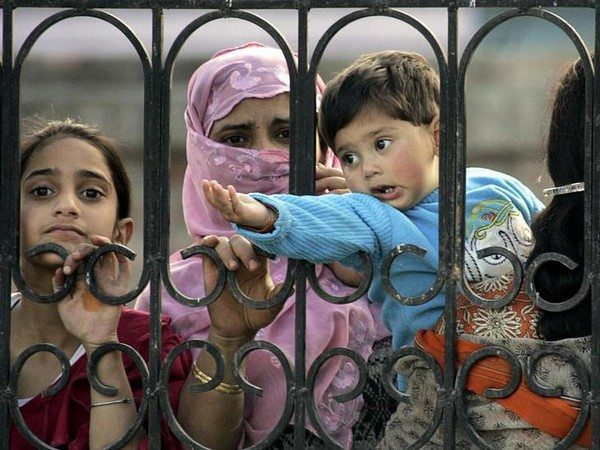BY NYLA ALI KHAN
 Ethnographer Sharon Pickering, in her study of women in Northern Ireland, theorizes that historically, political analysts and social scientists have not considered the experiences of those coerced and tortured by state violence as relevant to their studies [Pickering 2001: 490]. But the unflinching courage of several marginalized women in Jammu and Kashmir in their fight for justice symbolizes the self-actualization and intervention of Kashmiri women in patriarchal national history by speaking from their locations about the current political realities.
Ethnographer Sharon Pickering, in her study of women in Northern Ireland, theorizes that historically, political analysts and social scientists have not considered the experiences of those coerced and tortured by state violence as relevant to their studies [Pickering 2001: 490]. But the unflinching courage of several marginalized women in Jammu and Kashmir in their fight for justice symbolizes the self-actualization and intervention of Kashmiri women in patriarchal national history by speaking from their locations about the current political realities.
In order to further my research in June 2009, I asked the director of the Psychiatric Diseases Hospital, Dr. Margoob, to allow me to sit in on a couple of his sessions with militancy related trauma patients. Dr. Margoob was magnanimous enough to give me the permission to observe some of these patients carefully.
It was heart wrenching to see despondent women with hopelessness entrenched in their atrophied looks and minds. Orphaned, widowed, improvident; socially marginalized and left to their own devices; unsought by those with the means to help; each sigh bespoke a grief that knew no bounds and had no hope of respite.
These repositories of communal values and cultural traditions were unable to find a support system in a community that had experienced the trauma of state-formation at its expense. The political turbulence in J & K has taken its toll on such people and has left them stone faced with a stoicism that expects no recompense.
Does the state give any thought to the economic and emotional rehabilitation of such people? Dr. Margoob lends a sympathetic ear to his patients; provides them with fatherly care; boosts their morale; is quick to provide them with the necessary medical care; and is doing groundbreaking work in a culture in which people don’t mention psychiatric ills without fear of being stigmatized.
It was enlightening to see young men and women seeking psychiatric care of their own volition. I was pleasantly surprised to see a peasant from a rural area take his grandson to the child psychologist and beseech his grandson to conceal nothing from the psychologist.
But we still have a long way to go in recognizing the dire consequences of trauma brought on by political turmoil, military brutality, and fear psychosis created by such happenings. There are people who do not have recourse to the judicial and administrative machinery.
Prabal Mahato found in an independent survey of the Psychiatric Diseases Hospital in Srinagar, conducted in July-August 1999, that post-traumatic stress disorders increased from 1,700 in 1990 to 17,000 in 1993 and to 30, 000 in 1998 [1999]. It is unfortunate that the more unaccountable state-sponsored agencies have become in J & K, the more aloof and gluttonous the bureaucratic, military, and administrative machinery has become.
The culture of impunity has grown around India and Pakistan like nobody’s business. Women and children are in a miserable plight because of the lack of not just physical infrastructure but deficit in gynecological, obstetric, welfare, and economically rehabilitative services as well.
I met three women patients of Dr. Margoob who were traumatized after the loss of their male heads of the households. Two of the women had been widowed and the third orphaned because of the frenetic violence at the apex of insurgency and counter-insurgency in J & K.
Their counseling sessions with Dr. Margoob were enabling them to redefine their life experiences as contributing to the depression and suicidal ideation in their adult lives; work through the discourse of victimhood was developing into the construction of their identities as survivors; working toward accepting their life circumstances and tentatively attempting to redefine them within clear conceptual frameworks [See Susan Warner and Kathryn M. Feltey, “Recovered Memories and Identity Transformation” in “From Victim to Survivor: Recovered Memories and Identity Transformation”, in Trauma and Memory, edited by Linda M. Williams and Victoria L. Banyard, 1999: 161-174, for details about traumatized women and identity reconstruction].
Do such patients have access to a community perspective, or a reference group, or avenues for rehabilitation? [Shibutani 1961].
– Nyla Ali Khan is a member of the Scholars Strategy Network and the author of Fiction of Nationality in an Era of Transnationalism; Islam, Women, and Violence in Kashmir; The Life of a Kashmiri Woman, and the editor of The Parchment of Kashmir. She is editor of the Oxford Islamic Studies’ Online’s special issue on Jammu and Kashmir. She can be reached at nylakhan@aol.com.







